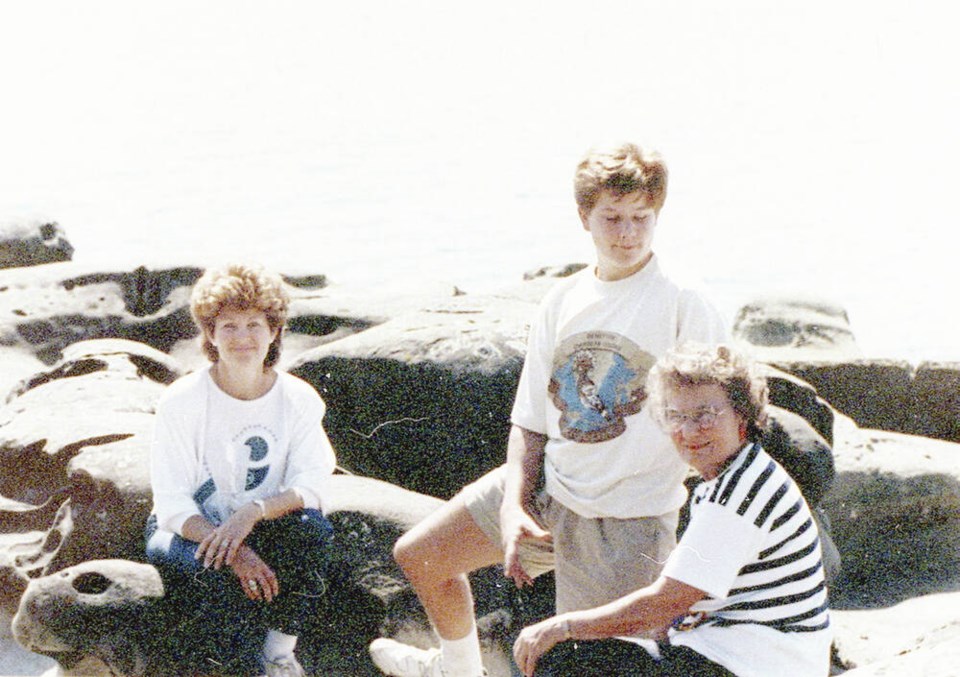Darren Gowen — formerly known as Darren Huenemann — who arranged for his Mount Douglas Secondary School classmates to kill his mother and grandmother in 1990 in an effort to get a $4-million inheritance has been granted a six-month extension of day parole.
Now 50, he was first granted six months of day parole in August 2022.
Gowen, who was 18 at the time of the killings, orchestrated the murders of his 47-year-old mother, Sharon Huenemann, and 69-year-old grandmother, Doris Leatherbarrow, at Leatherbarrow’s home in Tsawwassen.
His classmates Derik Lord and David Muir carried out the murders with a knife and a crowbar while Gowen stayed in Victoria with his girlfriend.
The crime scene was made to look like a burglary had taken place.
Huenemann was given a life sentence with no chance of parole for 25 years, while Lord and Muir were sentenced to life with no chance of parole for 10 years.
Gowen was also found guilty of a 1996 escape from prison, as well as an assault.
Terms of the August 2022 day parole included that Gowen not travel to B.C. and that he attend psychological counselling. Day parole allows for participation in activities in the community, with offenders required to return each night to a community residental facility or halfway house.
In its Feb. 1 decision, the Parole Board of Canada said Gowen respected his conditions and obeyed the rules at his community residential facility during his time in the community.
A 2017 psychiatric assessment showed “positive impressions pertaining to your accountability and emotional/psychiatric domains,” the decision said, with his psychiatrist saying Gowen had made “significant progress” over the years.
“You were emotional when expressing regrets and remorse,” the decision said. “You accepted all of the blame and did not show any sign of a narcissistic or antisocial personality.”
A psychological assessment that followed in 2020 noted that Gowen’s crimes occurred “in a particular and specific context when you were approaching adulthood.”
“Over the last decades, you have clearly done a lot of work on yourself, which has allowed you to approach your reality, but especially that of others, in a more sensitive and open manner.”
The assessment said his risk of “violent recidivism” is now moderate to low in the medium and long terms.
Gowen was granted unescorted stays at a halfway house in 2021, a year after a similar request was denied.
At the time, he was in a minimum-security facility in Quebec. He was initially allowed one two-day unescorted temporary absence a month.
Gowen has taken part in a number of programs while in prison to deal with issues like anger management and violence prevention, the decision said.
He had a good attitude while in the workplace during his day parole, the decision added, but expressed frustration at one point because he “felt like a slave.”
The board said he got discouraged when he didn’t find a job right away, then began work in November with a group that supports the unemployed and helps them get into the labour market.
“So far, your supervisor’s feedback is very positive,” the decision said.
It concluded that Gowen “will not present an undue risk to society” while on day parole, and it will help in his reintegration as a law-abiding citizen.
Lord, who continues to maintain his innocence, was granted a six-month extension of his day parole in January. He was first granted day parole in March 2020.
Muir, who admitted his role in the murders, got day parole in 2002 and was given full parole in 2003.
>>> To comment on this article, write a letter to the editor: [email protected]



